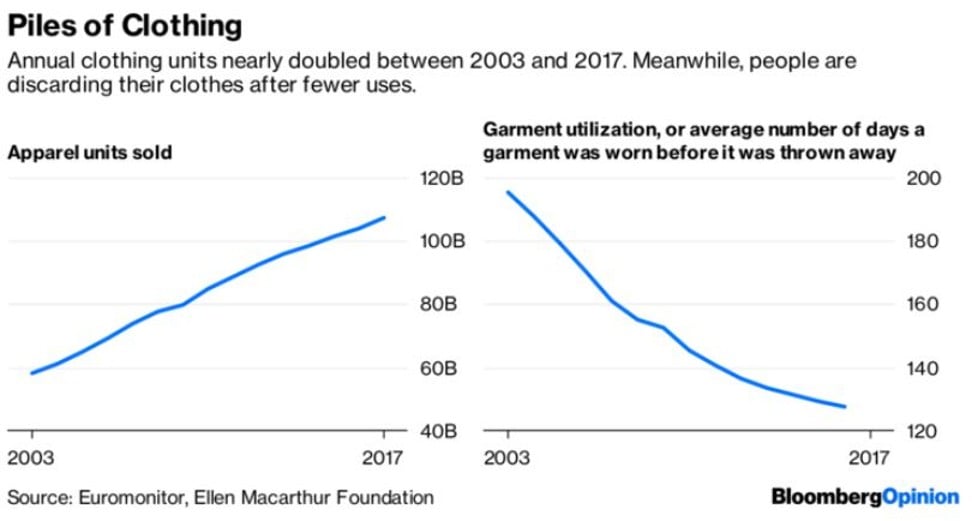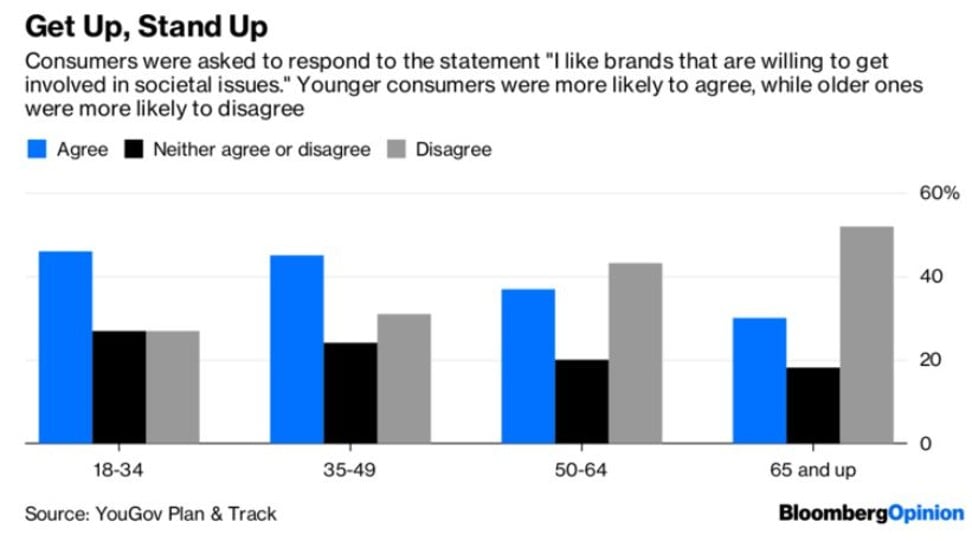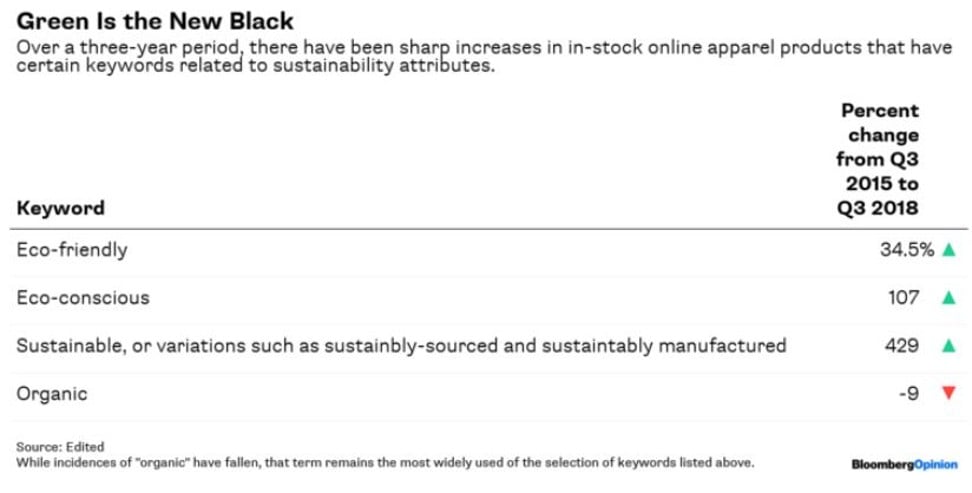For years now, we’ve watched the old guard of the packaged-food industry get pummelled as consumers look to fill their grocery carts with trendier items bearing feel-good labels such as “natural” or “sustainably sourced”.
The beauty business, too, has had to adapt to this changing ethos; hence the proliferation of skincare products billed “eco-conscious” or “organic”.
So we can’t help but wonder: is the apparel industry next?
Livia Firth: We're not going to be in a world without leather or wool
Several prominent clothing retailers are revamping their manufacturing and tailoring their brand images for just this kind of change. J. Crew Group, for example, recently debuted its “Eco Jean”, a selection of denim it boasts is made from “sustainably dyed organic Italian cotton”.
Earlier this year, Levi Strauss & Co. announced a new initiative that eliminates many chemicals from its jeans manufacturing process and reduces textile waste. In Europe, luxury group Kering, Swedish fast-fashion chain Hennes & Mauritz (H&M), and British retailer Marks & Spencer Group have all undertaken environmental and social projects. These range from a library of 3,000 sustainable fabrics that Kering’s luxury brands can draw on, to recycling more than 30 million garments over the past 10 years at M&S stores.
These brands have very good reasons to take these steps and highlight them in their messaging to customers.
The environmental concerns around clothing manufacturing are more acute than ever before. Nearly twice as much apparel was sold in 2017 than in 2003. Some of that reflects growing spending power of consumers in emerging economies. But it also reflects the rise of fast fashion, which has trained shoppers to think differently about the shelf life of the goods in their wardrobe. People are tiring of their wardrobes more quickly, with global clothing utilisation – or the number of times a garment is worn – declining significantly in recent years.
Meanwhile, Helga Vanthournout, a sustainability expert at McKinsey & Co., points out that very little of our clothing is recycled, in part because it can be a technical challenge to do so for blended fabrics such as a cotton-polyester.
Policymakers are taking notice of this issue, such as in the UK, where a committee of lawmakers has launched an inquiry into the sustainability of the fashion industry. Against that backdrop, clothing companies are going to want to have good answers for how they are going to be part of the solution to a mounting problem. If they don’t, they might find themselves painted as corporate bad guys.
Why luxury brands are jumping on the eco-friendly wagon
But beyond that, and even more importantly, apparel makers don’t want to risk being late to what could be a consequential shift in consumer preferences. Chip Bergh, CEO of Levi Strauss, told Bloomberg Opinion this summer that he has observed sustainability being particularly important to younger shoppers – the ones retailers covet most.
“There’s no question, millennials care about it more than baby boomers. And Gen Z cares about it more than millennials,” Bergh said.
YouGov, an opinion and data-research company, has found that younger consumers are more likely than older ones to like it when brands take a stand on something. So why not do so on sustainability?
There are hints that the clothing world is moving toward prioritising sustainability. Edited, a fashion data-research firm, analysed online product listings across more than 52,000 apparel brands. It found a strong increase over the last three years in garments labelled with certain descriptors related to sustainability.
That doesn’t necessarily mean companies are making more such goods, but at the very least, it means they are trumpeting those characteristics more. That likely means they’ve concluded that this matters more now to consumers.
H&M first ventured into sustainability in the 1990s with its Nature Calling collection. However, it didn’t take off – not just because of the unfortunate name, but also because the products weren’t stylish enough. It tried again in 2005, when it collaborated with Stella McCartney, and in spring 2010, launched its first Conscious Collection. Products launched this year have included accessories made from discarded candlesticks, and dresses made out of fishnets and other nylon waste, offered at a range of price points. H&M is able to make these cheap-chic pieces more environmentally friendly in part because of its large scale. Huge volumes mean it can offset the higher cost of using greener materials.
Why luxury brands are jumping on the eco-friendly wagon
Among smaller producers, Community Clothing, a social enterprise founded by British tailor Patrick Grant, sells a range of classic fashion items that are manufactured at British factories at times of the year when they would otherwise be idle. The facilities work to the highest environmental and social standards and as they produce locally, there is less damage from transporting goods long distances. The price points aren’t those of fast fashion, but they compare well to mid-market stores. The aim is that as sales increase, factory volumes should escalate and economies of scale kick in.
To be sure, there is reason to be sceptical that sustainability attributes will ever influence fashion purchases to the extent they have in the food business. After all, in food and beauty, “organic” has basically become a proxy for “healthy”. That logic doesn’t apply in quite the same way with apparel, so it’s possible it won’t stir shoppers’ passions as dramatically.
14 of the best places for your eco-friendly ‘zero waste’ shopping
But it seems inevitable that sustainability will figure at least somewhat more prominently into apparel-purchase decisions in the near future. And so clothing retailers must be ready to do right on this issue – and to tout their efforts to customers instead of just burying updates about it in their annual reports.
We suspect their customers will think eco-consciousness is a good look.
Want more stories like this? Sign up here. Follow STYLE on Facebook, Instagram and Twitter
https://www.scmp.com/magazines/style/fashion-beauty/article/2171372/fashion-labels-their-eco-vibe-keep-millennials-buying


No comments:
Post a Comment